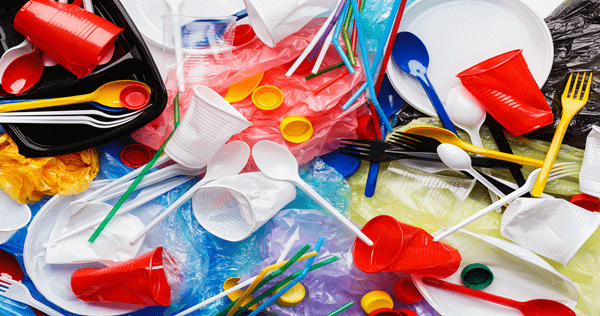
Are We Addicted to Plastic?
A straw with our drink, a plastic bag for takeout food, a wrapper on a tasty treat -- for many of us, these conveniences are part of our daily routine. But everyday items packaged in plastic that we use once and toss away in the trash, come with a steep environmental price.Byline: BTB Editor
August 6, 2020 / Time to read: 5 minWhat is single-use plastic?
Single-use plastics are disposable items most of us use daily, such as straws, utensils, to-go containers, water bottles and plastic bags.
Why is single-use bad?
Simply put, our planet is drowning in plastics pollution. We produce 300 million tons of plastic each year worldwide,¹ half of which is for single-use items. The chemicals used to make single-use plastics so convenient for one-time use, also make them resistant to breaking down naturally.
If it’s not recycled, plastic ends up in landfills or in the environment which can have a negative impact on wildlife and our health. One of the most commonly recycled plastics is polyethylene terephthalate (often referred to as PET), the material used to make most water and soda bottles can be turned into everything from shoes and polyester fabric to car parts. But an estimated 91% of all plastic isn’t recycled at all.²
About 300 million tons of plastics are produced worldwide each year and half of which is for single-use items, according to NRDC.
COVID-19 has hampered single-use reduction policies
Before the pandemic, reusable tote bags, ceramic mugs, reusable water bottles and sustainable foodware had become part of daily life for many people. By June, plastic bag bans and other policies adopted by many municipalities to reduce single-use items were suspended. Fearing the spread of the virus on reusable bags that people bring from home, retailers brought plastic bags back into stores, banning reusable ones for the time being.³ The
Tips to limit single-use items
- Buy reusable totes, a reusable water bottle, pack it alongside reusable plates and cutlery
- Carry a metal or reusable straw
- Cook more often to reduce your use of plastic bags and disposable takeout containers
- Avoid plastic wrap by storing leftovers in reusable containers
- Buy in bulk to avoid individually packaged goods like snack packs
Sources:
1.
2.
3.
